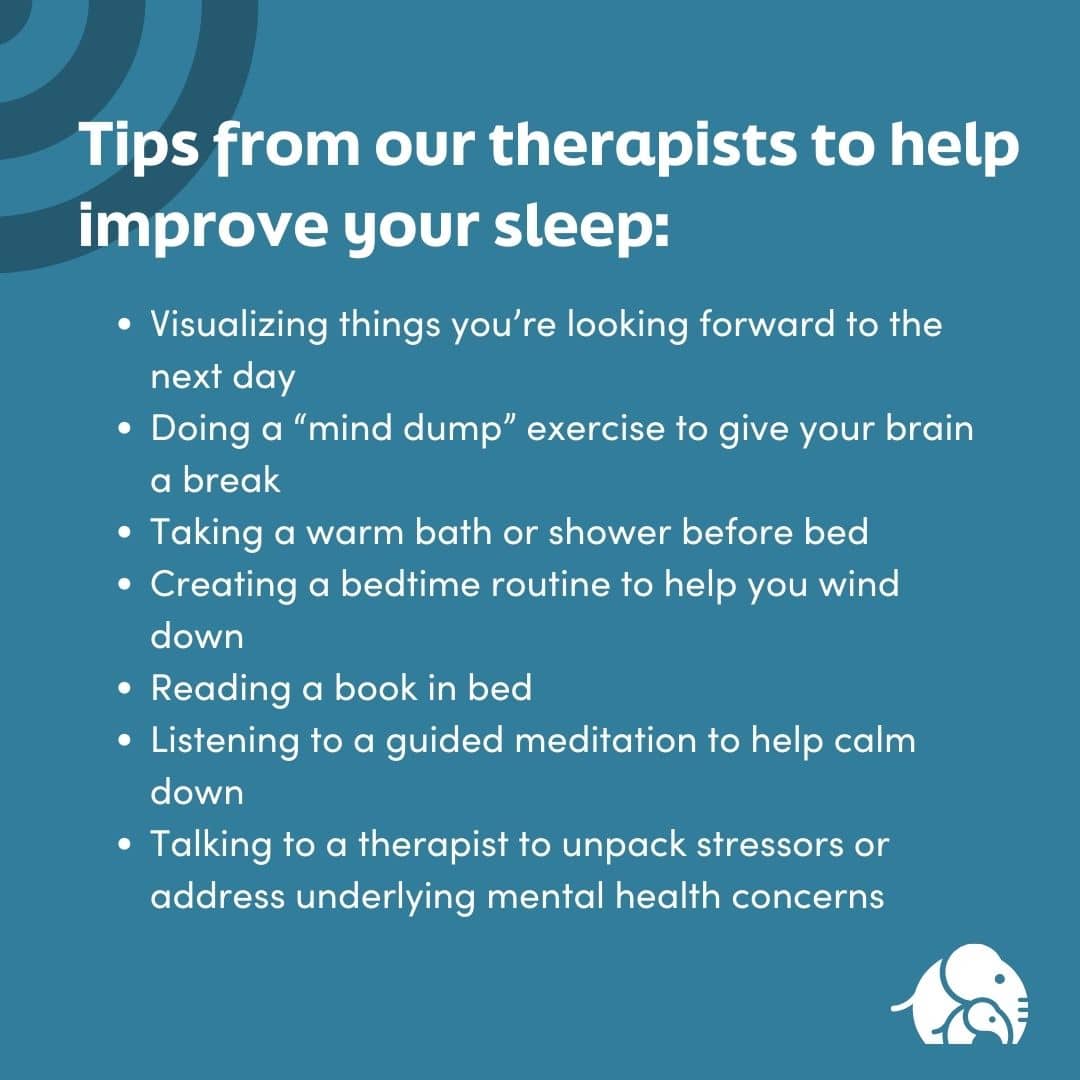Impact of Sleep on Mental Health
We know that there is a close relationship between sleep and mental wellbeing. Poor sleep not only affects your mental health, but your mental health can also affect your sleep (it can be a chicken-and-the-egg sort of scenario). For example, people with insomnia are between 10 and 17 times more likely to experience depression and anxiety.
The Mental Health Foundation shares that sleep “is as essential to our bodies as eating, drinking and breathing, and is vital for maintaining good mental and physical health. Sleeping helps to repair and restore our brains, not just our bodies.” Sleep helps our brain to process information and store our long-term memories. If we aren’t sleeping well, we aren’t allowing our brains that crucial time to heal and process.
Stress and its Impact on Sleep
We’ve all been there: a difficult day or stressful interaction leads to tossing and turning all night long. Stress can make it hard to fall asleep, and poor sleep can stress you out even more. So how do you stop that cycle and reduce your stress?
You might be familiar with cortisol- AKA “the stress hormone.” Cortisol plays an important role in keeping us safe from dangers. When you are stressed, cortisol is released into your bloodstream, keeps you on high alert, and gives you more energy (like if you needed to outrun a predator). The problem is that sometimes your body has difficulty differentiating between running from a tiger and having a big presentation at work… it just views it all as danger and so even minor stressors can result in a release of cortisol. Our bodies naturally have lower levels of cortisol in the evening to help us sleep– unless it perceives some kind of danger or stressor (hence the trouble sleeping).
According to the APA, people who sleep less than eight hours per night are more likely to report high stress in the past month with symptoms such as:
- Feeling more irritable or angry than adults who sleep more than eight hours a night
- Feeling more overwhelmed
- Lacking interest, motivation or energy
- Losing patience or yelling at their children
- Losing patience or yelling at their spouse or partner
- Skipping exercise
We know that sleeping less than eight hours per night ends up negatively affecting your mood, your health, your work, and the people around you—but there are many techniques for improving your sleep!
Need more support? Find an Ellie location near you today and get expert tips on improving sleep and mental health.
Stress Reduction Techniques for Improved Mental Health
As a therapist, I often suggest doing a “mind dump” exercise for my clients that find themselves in this position. To do this exercise, get a paper and pen, and set a timer for two minutes. In those two minutes, write down everything that comes to mind: everything that you’re worried about, the things you have on your to do list, the things you’re dreading, and the things you are looking forward to. You can set your timer for longer if you feel like you have more on your mind.
A therapist at Ellie, Isaac Wicker, MS shared this analogy: our minds are like a backpack that can only hold so much. When you do a mind dump, you are giving your mind permission to set the stressors down onto the piece of paper. Those stressors won’t be forgotten, but they give your mind a little break. This can be especially helpful when you’re about to go to bed and you feel like your mind is spiraling.
Other Sleep Issues Caused by Anxiety
Stress and anxiety can keep us tossing and turning, but it can also cause us to wake up throughout the night. Worry is often connected to sleep issues and even other sleep disturbances like nightmares or night terrors.
Night terrors are more common in children and typically get better as the child gets older. Stress and anxiety are common triggers to night terrors, so techniques that improve anxiety can often decrease night terrors too. One thing to note: Nightmares and night terrors are similar, but they occur at different times in our sleep cycle and nightmares are typically less intense and more easily remembered the next day.
Main characteristics of night terrors include:
- Sudden waking up from sleep
- Not being able to remember them the following morning
- Physical symptoms like racing heart, sitting up in bed, screaming, rapid breathing or stiffness
Creating Healthy Sleep Habits:

There’s clear evidence that improving your sleep reduces your symptoms of depression, anxiety, and stress. We asked some of our therapists what their recommendations were for when their clients have trouble sleeping. Here’s what they suggested to develop healthy sleep habits for better mental well-being:
- Create a bedtime routine to help you wind down
- Visualize things you’re looking forward to the next day
- Do a “mind dump” exercise to give your mind a break
- Limit caffeine use well before bedtime
- Take a warm bath or shower before bed
- Journaling before bed can be helpful to process the day’s events
- Read a book in bed instead of scrolling on your phone
- Listen to a guided meditation to help calm down
- Exercise during the day
When it’s Time for Professional Help
Seeking professional help is important, especially when anxiety, stress, or depression begins to interfere with sleep. A qualified therapist can offer a supportive space to unpack and address any underlying issues that could be contributing to sleep issues. Through therapy, individuals can learn coping strategies, relaxation techniques, and cognitive-behavioral interventions tailored to manage anxiety, stress, or depression, consequently improving sleep quality and overall well-being.
Need more support? Find an Ellie location near you today and get expert tips on improving sleep and mental health.
Key Points:
- Sleep and mental health go hand in hand: prioritize your mental health by prioritizing your sleep habits!
- Adults who get more than eight hours of sleep per night report lower stress levels, feeling less overwhelmed, less irritability, and more patience.
- There are many ways that therapy can help to improve your sleep. A therapist might also recommend different strategies including: creating a bedtime routine to wind down, listen to calming music or guided meditations before bed, and doing a mind dump exercise.
Sources:


